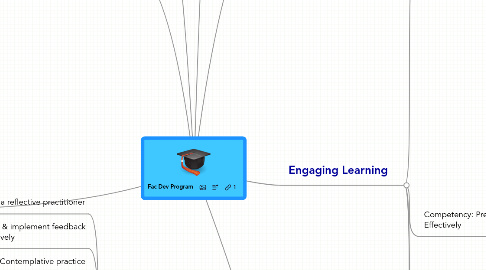
1. Navigating Digital Literacy
1.1. Digital identity
1.2. online classroom management skills
1.3. Content development for mobile devices
1.4. UBC supported tools
1.4.1. wikis
1.4.2. Blogs
1.4.3. web-conferencing skills
1.4.4. Turnitin
1.5. social media
1.6. OER
1.7. LMS
1.7.1. f2f training
1.7.2. PDF resources
1.7.3. Online training
2. Nurturing Your Practice
2.1. Become a reflective practitioner
2.2. Solicit & implement feedback effectively
2.3. Contemplative practice
2.4. Be confident in front of a large group of students
2.5. Be able to document T&L practices, evidence-based practice
2.6. Research skills
2.7. Is innovating
2.8. Developing metacognition
2.9. Be mindful of different learning theories, student backgrounds, and diversity
2.10. Documenting teaching
2.11. Developing an effective pedagogical component for grant proposals
2.12. Fluency in English pronounciation for University lecturers
3. Teaching 21st Century Skills
3.1. Communication/Writing skills development
3.2. Engendering critical thinking
3.3. Concept Mapping Tools
3.4. Nurturing creativity
4. Knowing the Landscape
4.1. Navigating Possibilities
4.1.1. Co-teaching
4.1.2. Open education considerations
4.1.3. Place & Promise: walking the talk
4.1.4. Ethics
4.2. Become aware of T & L resources (online, F2F, mentoring) available in units across campus
4.3. Know what's going on in other classes on campus
4.4. Recognize and take advantage of opportunities for interdisciplinary collaboration
4.5. Deal appropriately with matters of discipline, academic misconduct, and legal info
4.6. Knowing & Embracing Your Role(s)
4.6.1. Be mentor, guide, counsellor, friend, expert, etc.
4.7. UBC Context
4.7.1. Student Demographics at UBC
4.7.2. Resources for Students
5. Course Planning & Development
5.1. Be fair in assessment
5.2. Ongoing assessment
5.3. Scaffold knowledge
5.4. Use appropriate evaluation methods to measure learning outcomes
5.5. Summative assessment
5.6. Develop online assessment skills
5.7. Provide fair and timely feedback
5.8. ID & communicate learning objectives
5.9. Recognize the learning goals of students in a large class
5.10. Show understanding of the relevance of the course content and the students' personal goals
6. Engaging Learning
6.1. Competency: Engaging students in their own learning
6.1.1. Leading discussions
6.1.2. Personal response systems
6.1.3. Using Active Learning
6.1.3.1. Problem-Based Learning (PBL)
6.1.3.1.1. Existing Programs & Resources
6.1.3.1.2. Potential New Programs
6.1.3.2. Team-Based Learning (TBL)
6.1.3.3. Community Service Learning (CSL)
6.1.4. ?
6.2. Competency: Presenting Effectively
6.2.1. Be well-organized/have clear structure, i.e. present organized lectures
6.2.2. Challenge the students with new ideas
6.2.3. Know the subject matter well
6.2.4. Develop and communicate pedagogical content knowledge
6.2.5. Present the content in a fun, engaging manner
6.2.6. Communicate passion for your subject, research, and teaching
6.2.7. Existing Programs & Resources
6.2.7.1. Teachers As Actors
6.2.7.2. Resource package & handouts
6.2.7.3. Voice
6.2.7.4. Effective PowerPoint presentations
6.3. Competency: Strengthening collaboration skills
6.3.1. Using blogs
6.3.2. Using wikis
6.3.3. Using Google and Google Apps
6.4. Competency: Teaching strategies for different classroom situations
6.4.1. Teaching large classes
6.4.2. Teaching labs
6.4.3. Leading seminars
